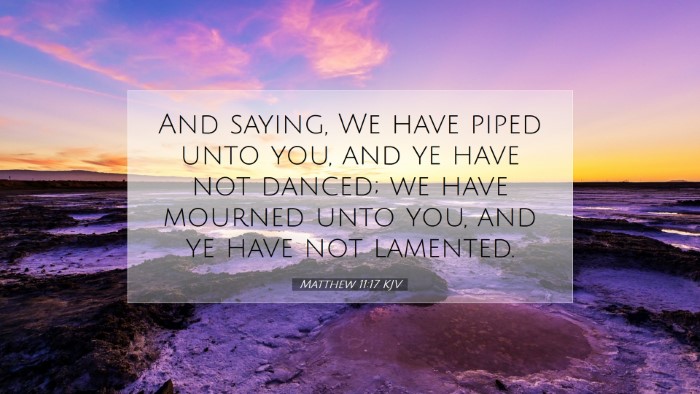Commentary on Matthew 11:17
Bible Verse: "And saying, We have piped unto you, and ye have not danced; we have mourned unto you, and ye have not lamented."
Introduction
This verse encapsulates a profound dialogue that reflects the interactions between Jesus and the religious leaders of His time. The sentiments expressed through this metaphorical language of piping and mourning convey deep theological implications and highlight the unresponsiveness of the people to divine prompts.
The Context of Matthew 11:17
Matthew 11 marks a pivotal moment in the ministry of Jesus. It follows a series of miracles and teachings, where Christ reveals His identity and mission. His relationship with John the Baptist and the contrasting receptions of their messages are crucial to understanding this verse. Jesus uses this metaphor to emphasize the inconsistency of the listeners.
- The Role of John the Baptist: John’s ascetic lifestyle was met with skepticism, while Jesus, in contrast, was criticized for His sociability and association with sinners.
- Reader’s Perception: The audience's failure to respond appropriately to both the joyous and sorrowful sides of biblical truth highlights their obstinacy.
Interpretative Insights
Different commentaries provide unique lenses to interpret Matthew 11:17, emphasizing themes of rejection, spiritual insensitivity, and the nature of divine communication.
Matthew Henry
Henry points out that this metaphor of piping and mourning symbolizes the dual nature of God's calls—joyful celebration and sorrowful lamentation. He suggests that:
- People often select what they wish to follow based on their preferences, ignoring the holistic call of God.
- Jesus' mention of the different tunes played signifies the inconsistency of the people's responses to God’s messages through His messengers.
Albert Barnes
Barnes emphasizes the contrast between the joyful invitation to salvation and the serious warning against sin. He elaborates on how:
- The “piping” represents the joyous announcement of the Gospel, while the “mourning” signifies the call to repentance.
- The reaction of the people illustrates spiritual blindness and hardness of heart; they remain unmoved by the clear signals from God.
Adam Clarke
Clarke elaborates further, asserting that this verse reveals human nature's tendency to reject what does not align with personal expectations or desires. He argues:
- Different societal groups respond differently to God's calls—exemplifying how cultural preconceptions can cloud judgment.
- The failure to dance or lament highlights a refusal to engage with the profound truths of the Gospel.
Theological Implications
The silence of the people serves as a warning for contemporary faith communities. The rejection of divine messages has significant implications:
- Spiritual Awareness: Believers must be attuned to how they respond to different aspects of God's communication.
- Holistic Faith: Engagement with both celebration and mourning within the Christian walk is crucial for a robust faith life.
- Responsiveness to God's Call: The necessity for sensitivity to the various ways God speaks—be it in joy or sorrow—remains vital for spiritual growth.
Application for Modern Believers
For pastors, students, and theologians, Matthew 11:17 serves as a challenge to evaluate personal and communal responses to God's varied messages. Consider the following applications:
- Encouraging Openness: Congregations should be encouraged to respond to the full breadth of God's word, whether it brings joy, comfort, or conviction.
- Discerning the Spirit: Pastors ought to guide their communities in discerning and being responsive to the leading of the Holy Spirit in all circumstances.
- Promoting a Balanced Theology: Emphasize that a complete understanding of the Gospel includes both the joyous and lamenting aspects of faith.
Conclusion
In conclusion, Matthew 11:17 is a poignant reminder of the human tendency to resist the divine overtures in life. By invoking the imagery of piping and mourning, Jesus critiques the state of the hearts of His audience. The insights drawn from various commentaries not only enhance our understanding of this verse but also invite us to a more profound engagement with the richness of God's communication in our lives. As the church today considers how it responds to God, may we strive to embrace the full spectrum of His call.


